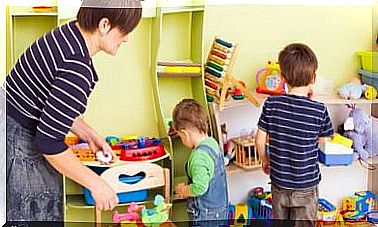Emotional Strength In Children: This Is How It Develops

Emotional strength helps make children purposeful, courageous and confident, helping them reach their maximum potential. In this article we will offer you 10 tips to help them develop it.
Emotional strength develops when you equip your children with the weapons they need to deal with the various situations that arise in life. As mothers, you need to remember that children with emotional strength are ready for all kinds of challenges.
In fact, they are able to cope with problems, recover from failure and cope with all kinds of difficulties.
Likewise, helping children develop mental strength requires threefold effort. First of all, they must be taught to replace negative thoughts with more realistic ones. Then you have to help them learn to control their emotions. And finally, you have to show them how to take positive measures.
10 tips for developing emotional strength in children
There are many teaching strategies and tools that help children develop emotional strength. We offer you 10 tips that will help your child develop emotional strength:
1. Teach them specific skills
The first tip for developing emotional strength in children is to teach them to do better next time, without suffering from their mistakes. You must impose consequences that teach specific skills, such as problem solving, impulse control, and self-discipline.
This set of skills will help your child learn to behave correctly , even when faced with temptation or difficult circumstances.
2. Let your child make mistakes
Teach the child that mistakes are part of the learning process. In this way, if he will commit one, he will not be ashamed.
Similarly, when it is safe to do so, the consequences must be natural. For this you must discuss with him how to avoid repeating the same mistake in the future.

3. Teach your child to think healthily
Children find it difficult to feel emotional strength when they experience humiliation or expect catastrophic results.
In this sense, you should teach your child to process negative thoughts to think more realistically. Developing an objective and at the same time optimistic perspective will help him to give his best and overcome unfavorable situations.
4. Encourage the child to face fears
If your child avoids doing something that scares them, they will never have the confidence they need to stop feeling uncomfortable. That is why it is recommended that you help him deal with this type of situation.
Give him courage, praise his efforts and reward him for being so brave. In this way, he will step out of his comfort zone and learn to be a child capable of achieving whatever goal he sets himself.
5. Let the baby feel uncomfortable
While it may be tempting to help your child whenever he has a problem, getting him out of trouble will reinforce the feeling of being helpless.
Letting him taste defeat sometimes will make him feel responsible for his actions and make him achieve better results. Realize that, with your support and advice, situations like this will help the child develop mental strength.
6. Encourage a constructive character
Children need a strong moral contact to make healthy decisions. As their mother, you have to work hard to instill positive values in your child.
For example, when the child is in a competition of any kind, you need to focus on the importance of acquiring values such as honesty and compassion, rather than insisting on winning at all costs.
7. Make gratitude a priority
Gratitude is a wonderful remedy for self-pity and other bad habits that can contribute to your child’s mental weakness. In addition, it can improve your mood and promote proactive problem solving.
In this sense you must collaborate with him so that you learn to appreciate all the good things that happen to him. That way, even on the worst days, he’ll realize he has a lot to be grateful for.
8. Affirm his personal responsibility
Developing emotional strength means accepting personal responsibility. When your child is wrong or does not act correctly, you must allow them to explain but not to make excuses.
It is a good idea to correct him if he tries to blame others for the way they think, feel or behave.

9. Show him the ability to regulate emotions
Do not calm your child whenever he is angry or comfort him whenever he is sad. Instead, teach them to fight against unpleasant emotions. In doing so, he will not have to depend on you to regulate his mood.
Children who understand their feelings and know how to deal with them are better prepared to face challenges.
10. Enhance mental strength
Talk to him about his personal goals. Show him that he is taking the right steps to be stronger. Make self-improvement and mental strength a priority in his life.
Ultimately, the discovery of emotional strength in children occurs through a process of learning and self-reflection.
Applying the advice we have provided will help your child develop emotional strength and positive and creative thoughts. These will serve him to act wisely in the different situations of life.









